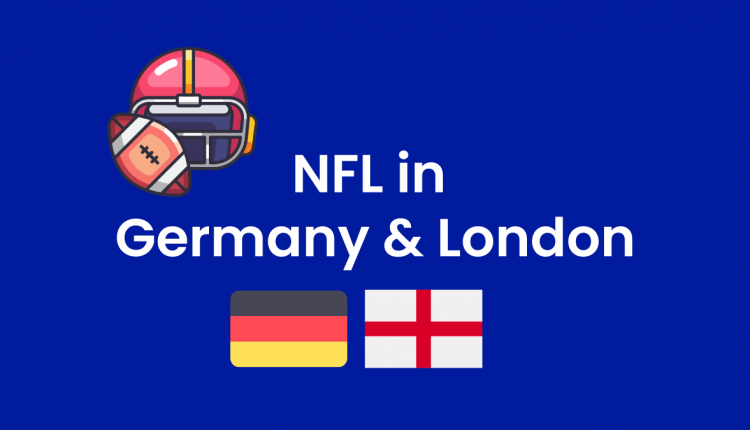NFL in Germany & London – do fans really care? It’s a question that comes up every season as the league expands its International Series. Packed stadiums in Munich, Frankfurt, and London seem to suggest the answer is “yes.” But beneath the hype, many wonder if this interest reflects genuine long-term passion or simply the novelty of a big American spectacle. The NFL’s push into Europe is part of a broader global strategy, but whether fans truly embrace the sport beyond a handful of showcase games remains a matter of debate.
From tailgates in Tottenham to chants in Frankfurt, European fans are proving they can bring their own flavor to American football. Yet cultural differences, time zone challenges, and soccer’s dominance leave questions about how deeply the NFL can take root abroad. This article explores the phenomenon: who the fans are, why games sell out, and what it means for the NFL’s future in Europe.
London: The Heart of the International Series
London has been hosting NFL games since 2007, and the city has become the epicenter of American football in Europe. Wembley Stadium and Tottenham Hotspur Stadium regularly sell out, with more than 80,000 fans packing the stands. Jerseys from every NFL team can be spotted, creating a carnival-like atmosphere unlike anything in the U.S., where home-team loyalty dominates.
The London experiment has shown that British fans care—but in their own way. Many support multiple teams, often chosen based on player popularity, colors, or even Madden video games. While the passion may not match the tribal loyalty of Premier League clubs, the enthusiasm is real, and merchandise sales continue to grow year after year.
Germany: A Surprising Powerhouse
Germany may be the NFL’s most promising international market. In 2022, when the league played its first-ever regular-season game in Munich, tickets sold out in minutes, with demand reportedly 3x higher than supply. The atmosphere shocked even veteran NFL players—fans sang, chanted, and created an energy similar to European soccer matches.
The roots of Germany’s NFL passion trace back to NFL Europe, a developmental league that operated from 1991 to 2007. German teams like the Frankfurt Galaxy and Rhein Fire built strong fan bases that never completely disappeared. Today, the German Football League (GFL) and rising participation in flag football have kept interest alive, making Germany perhaps the most “football-ready” nation outside North America.
Do Fans Truly Care, or Is It Novelty?
Critics argue that European interest in the NFL is more about the spectacle than the sport itself. They point to the fact that most fans don’t follow the full season or stay up late for U.S. primetime broadcasts. Instead, international games are treated like major events—similar to concerts or festivals—rather than week-to-week commitments.
Supporters counter that this is how fandom begins. Basketball and baseball once faced similar skepticism abroad, yet both found international audiences. With more exposure, youth leagues, and accessible broadcasts, NFL fan bases in London and Germany could deepen into true loyalty over time.
How Soccer Overshadows American Football
There’s no denying that soccer rules Europe. The Premier League in England and the Bundesliga in Germany dominate sports culture. For most fans, American football will never compete with Saturday matchdays or Champions League nights. Instead, the NFL exists as a secondary passion—a unique, imported experience rather than the main course of sporting life.
This doesn’t mean fans don’t care—it means they care differently. For some, the NFL is a chance to enjoy U.S. culture, food, and entertainment wrapped in a sporting event. For others, it’s about supporting a specific player (like Tom Brady or Patrick Mahomes) rather than a lifelong team allegiance.
Tailgates, Traditions, and Local Flavor
What makes NFL games abroad unique is how fans blend American traditions with local culture. In London, fans organize tailgates with burgers and beers, but mix in chants borrowed from soccer. In Germany, entire sections sing songs throughout the game—something rarely seen in U.S. stadiums. This hybrid fan culture suggests that Europeans are not just copying the NFL experience but reshaping it into something uniquely their own.
Merchandise and Media Growth
Sales of NFL jerseys, hats, and gear have skyrocketed in both London and Germany. Streaming platforms like DAZN and NFL Game Pass have made it easier for fans to follow games weekly, while social media spreads highlights instantly. Younger fans are especially engaged, often introduced to the sport through video games like Madden or through U.S. college football highlights online.
The media coverage in Europe has also expanded. British and German broadcasters now feature weekly NFL shows, and mainstream newspapers increasingly cover storylines beyond just international games. This shift suggests that interest is moving from event-based to sustained engagement.
Challenges Ahead for the NFL
Despite the enthusiasm, challenges remain. Time zones make live viewing difficult, with U.S. primetime games airing after midnight in Europe. Travel logistics for teams are grueling, raising questions about whether a permanent European franchise is realistic. And most importantly, the NFL must compete for attention in markets saturated with beloved local sports.
Still, the league’s willingness to invest—through more games, grassroots programs, and even exploring permanent teams—shows how seriously it takes the European experiment.
Conclusion: Do They Really Care?
So, NFL in Germany & London – do fans really care? The answer is yes, but in a different way than American fans. In Europe, the NFL is not a weekly religion—it is a spectacle, a cultural event, and a growing secondary passion. The sellout crowds, booming merchandise sales, and passionate chanting show genuine enthusiasm, even if it looks different from U.S. fandom.
Will it ever rival soccer? Probably not. But does it need to? Not necessarily. If the NFL can sustain loyal pockets of fans abroad, build traditions, and make international games a highlight of the season, it will have succeeded in creating a truly global sport—even if soccer still rules the world.

